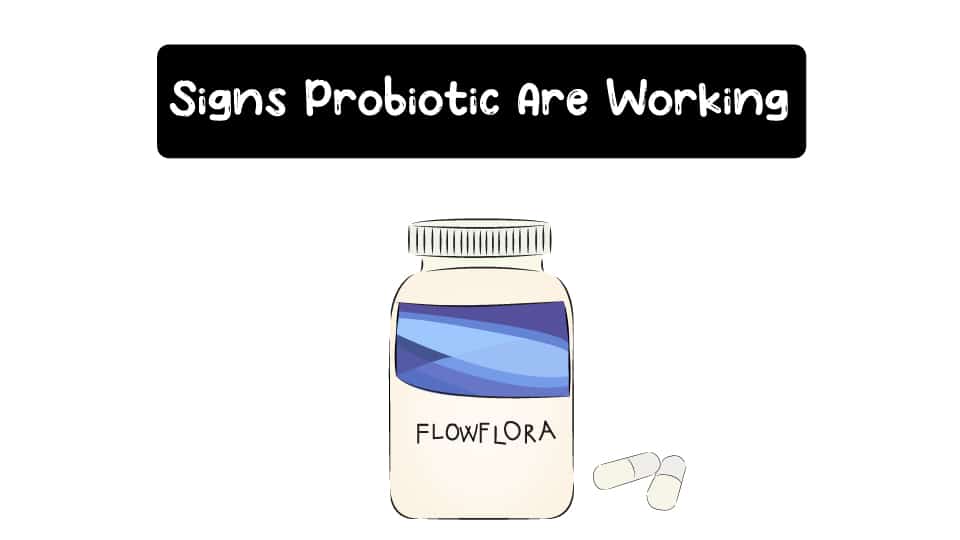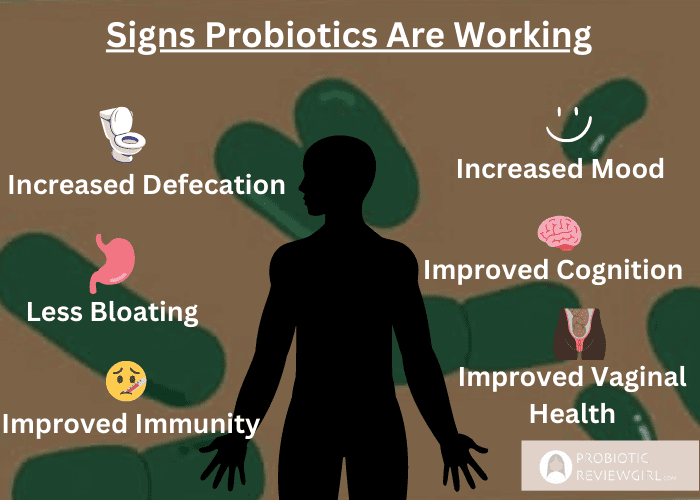6 Health Signs Probiotics Are Working: Digestive, Psychological And Vaginal

Signs that probiotics are working include increased defecation, also improved mood, bloating, cognition, immunity and vaginal health.
Probiotics are live microorganisms that, when consumed in adequate amounts, confer health benefits by positively influencing the balance of the gut microbiota.
In this guide, I have evaluated 6 health signs that indicate a probiotic is working as shown in this graphic.

1. Increased Defecation
Increased defecation refers to a higher frequency of bowel movements or visits to the toilet for passing stools.
A 2011 study authored by Merit Monique Tabbers, found that probiotics, specifically Bifidobacterium breve, can increase defecation frequency as a sign of their effectiveness.
When probiotics are effective in promoting digestive health, they can help regulate bowel movements and improve the efficiency of the digestive system. This can result in more regular and frequent trips to the toilet for defecation.
Increased defecation can be a positive sign that the probiotics are aiding in the proper functioning of the gastrointestinal tract, promoting regularity, and facilitating the elimination of waste materials from the body.
2. Improved Bloating
Bloating refers to the uncomfortable feeling of abdominal fullness, tightness, or distension caused by the accumulation of gas or fluid in the digestive system.
Probiotics, particularly specific strains like Lactobacillus Plantarum 299v, have been studied for their potential to alleviate IBS symptoms, including bloating.
Clinical trials by, Philippe Ducrotté, have shown that individuals taking probiotics experienced significant improvements in their IBS symptoms, with reduced bloating being one of the positive outcomes.
The presence of beneficial bacteria introduced by probiotic supplementation can help restore the balance of the gut microbiota, enhance digestion, and reduce the production of gas, which can contribute to bloating. Therefore, a reduction in bloating can be a sign that probiotics are effectively addressing the underlying gut issues and promoting digestive wellness.
3. Improved Mood
Mood, refers to an individual's emotional state or disposition, encompassing feelings such as happiness, sadness, irritability, or euphoria, that can impact overall well-being and mental health. Improved mood can be a sign that probiotics are working due to their potential to alleviate stress and anxiety.
Research by Lee-Ching Lew, has shown that certain probiotic strains, such as Lactobacillus plantarum P8, have been effective in reducing stress and anxiety levels in adults. In a randomized controlled trial, participants who consumed L. Plantarum experienced a significant reduction in stress and anxiety scores compared to those who received a placebo.
The positive impact on mood suggests that probiotics may play a role in promoting emotional well-being and mental health.
4. Improved Cognition
Cognition, refers to the mental processes and abilities related to acquiring, processing, storing, and retrieving information, including thinking, memory, attention, perception, language, and problem-solving.
Increased cognition, as a sign that probiotics are working, refers to improvements in cognitive functioning, including thinking abilities, memory, attention, and decision-making.
Clinical trials by Dr L. Rudzki MD, PhD, have shown that certain probiotics, such as Lactobacillus Plantarum 299v, have the potential to enhance cognitive performance, as demonstrated by improved cognitive scores and decreased kynurenine concentration through the gut-brain axis in individuals with Major Depressive Disorder.
5. Improved Immunity
Immunity, in a gut health context, refers to the body's ability to defend against harmful pathogens and maintain a balanced immune response through the interactions between the gut microbiota and the immune system.
Getting sick less often can be a sign that probiotics are working due to their ability to boost the immune system. Probiotics, such as Lactococcus lactis subsp. cremoris H61, have been shown to induce strong mucosal immunity against pathogens like HIV.
Through oral administration, probiotics can stimulate the immune response in mucosal tissues, including the gut, leading to a more robust defense against infections and reduced frequency of illnesses.
6. Improved Vaginal Health
Vaginal health refers to the state of optimal well-being and functioning of the vagina, including its surrounding tissues and microbiota, free from infections, discomfort, and abnormal conditions like candida.
The reduced occurrence of Candida infections can indicate that probiotics are working effectively. Studies have demonstrated that certain probiotic strains, such as Lactobacillus helveticus HY7801, can inhibit the growth of Candida and reduce the inflammatory response associated with vulvovaginal candidiasis.
These probiotics have shown the ability to modulate the vaginal microbiota and promote a healthy balance, leading to a decreased risk of Candida overgrowth and subsequent infections.
Signs Probiotics Are Working In Babies
Probiotics can exhibit several signs that they are working in babies. Firstly, when administered to malnourished infants, probiotics such as Bifidobacterium infantis along with human milk oligosaccharides have been observed to promote weight gain and reduce markers of intestinal inflammation.
Secondly, probiotics contribute to the development of a healthy microbiota in infants, as certain strains like Bifidobacterium longum infantis can digest and utilize human milk oligosaccharides, supporting optimal digestion and overall gut health.
Lastly, probiotics like Bifidobacterium infantis EVC001 have the potential to enhance breast milk quality by increasing the presence of beneficial bifidobacteria capable of metabolizing human breast milk oligosaccharides, thus benefiting the gut health and nutritional outcomes of preterm infants.
How Long Does It Take For Probiotic's To Work?
The effectiveness of probiotics can vary from person to person, but generally, it takes around 1 to 3 weeks for them to start showing noticeable effects.
During this time, probiotics work on nourishing the microbiome, reducing the presence of harmful bacteria, and exerting anti-inflammatory effects.
Signs Of Too Much Probiotics
Signs of too much probiotics can include increased gas, bloating, diarrhea, or more frequent bowel movements can indicate an overload of beneficial bacteria. These digestive issues are the body's way of signaling that the probiotic Colony Forming Units may be too high.
Dr. Sara Mesilhy has a Master’s degree in Gastroenterology and holds a membership with the Royal College of Physicians of the United Kingdom. She completed her Bachelor of Medicine, Bachelor of Surgery (MBBS) at Cairo University and is currently part of the ProbioticReviewGirl medical team.